The central coastal province of Phú Yên, a land of immense green grass fields scattered with yellow flowers and stunningly beautiful cliffs abutting the blue sea, is a highlight on the tourism map of Việt Nam.
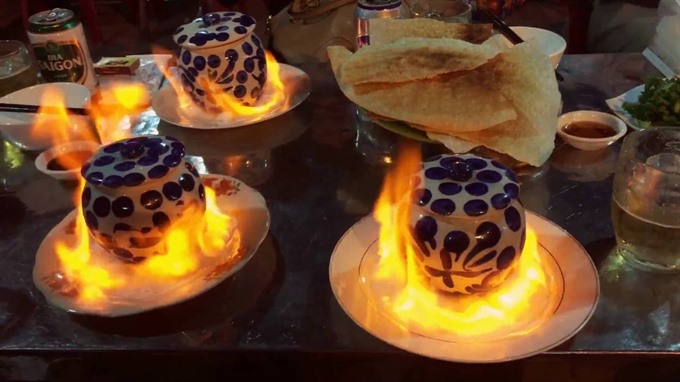
Fancy flames: Many restaurants keep the pot hot on the fire, which is an impressive scene at night. VNS Photo Thiên Hương
During a visit to Phú Yên, one can sit by the windy beach and enjoy slices of fresh tuna fish so cold that they may freeze your teeth. After that, warm up your stomach with the most distinguished delicacy of the region, a bowl of hot tuna eyes stewed with herbs, available at very reasonable price. The dish offers a distinctive taste of the area’s sea flavour.
Snack of fishermen
Phú Yên has been considered the capital of sea tuna in the country as fishermen in Phú Câu Village in Tuy Hòa City were among the first to bring home this kind of fish in 1994. Nguyễn Ngọc Sơn, a native of the village, knows how to make tuna dishes better than almost anyone.
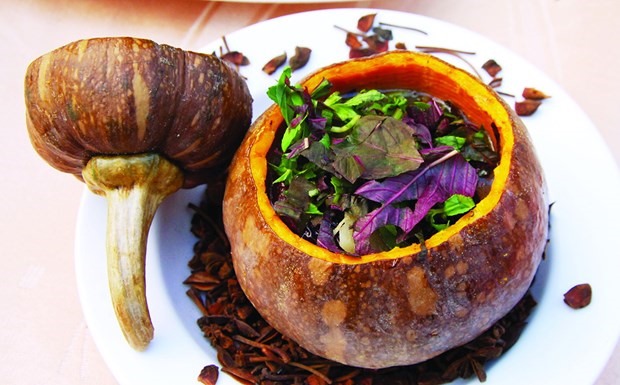
The eye is in a gourd: Some restaurants may serve tuna eyes inside pumpkins. Photo chiecthiavang.com
In the mid-1990s, Sơn opened a seafood restaurant called Sơn Cầu Gỗ on a street running along Đà Rằng River in Tuy Hòa City. His restaurant has become famous for its tasty seafood and reasonable prices.
“Before tuna became a good for export, fishermen just cut off its head, salted its body and sold the tuna’s head at local markets,” he told Tuổi Trẻ (Youth) newspaper. “But almost no one bought it. Hence fishermen instead cut off meat parts from the head, like the meat around the two cheeks and its eyes to cook and serve with wine.”
“I don’t remember exactly in 1998 or 1999, I tried to cook tuna eyes in a more complicated way to serve my guests,” he recalled, “People turned out to like the dish very much.”
Ocean tuna, also known with the local name of "cá bò gù", is highly nutritious and can be processed into various dishes. For a tuna weighing 40-50kg, each of its eyes may weigh between 100-200 grams. The easiest way to prepare the eye is by putting one fish eye into a bowl, adding salt and putting the bowl into a pan with water to boil it.
The more complicated method includes washing the eye carefully, scalding it to reduce the fishy smell and then putting each eye in a ceramic bowl.
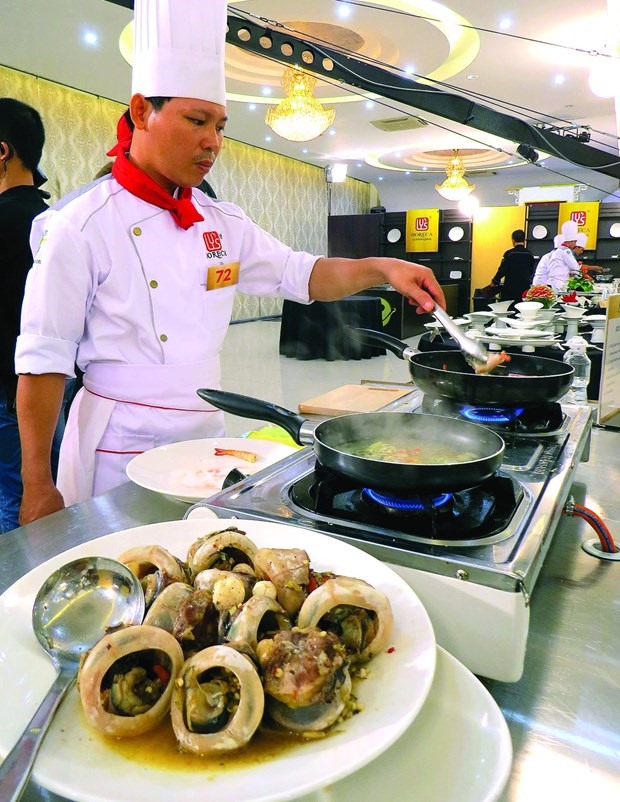
Eyes everywhere: Tuna eyes are popular in Phú Yên establishments from pavement restaurants to luxurious hotels. Photo chiecthiavang.com
The cook can add tomato juice and pineapple to increase flavour and at the same time soften the eye. Then sliced chili, pepper, onion, soya sauce and spices are added. The bowl is then boiled for 15-20 minutes until the eye is well cooked. The dish then should be eaten hot with fresh herbs like balm mint, basil and coriander.
Some restaurants keep the bowls hot with spirit cookers put on the tables. The fiery cookers make a great impression on tourists on summer nights when cooling winds blow in from the sea.
When the hot bowl is put on the table and the lid is opened, the fragrant smell of well-cooked eye fish flies out from the bowl. Diners should add the fresh herbs, stir well, add some spices and try the first bite.
One can taste the fatty and tender part of the eye, which contains the strong smell of the sea and blends with hot spices and herbs.
Local delicacy
The tuna fish eye has over time become a leading delicacy in Phú Yên. Tourists coming to Phú Yên can find the dish almost anywhere from pavement restaurants to five-star hotels.
Many restaurants have made the dish more special by stewing the fish eye with Chinese herbs.
“Chinese herbs not only add special flavours to the dish but also help digest the food better,” said Nguyễn Minh Chánh, an experienced cook from Tuy Hòa City. “Chinese herbs also help ensure the fish eyes don’t taste fishy.”
Some hotels even fry tuna eyes to make a crispy dish served with salad made from banana flowers.
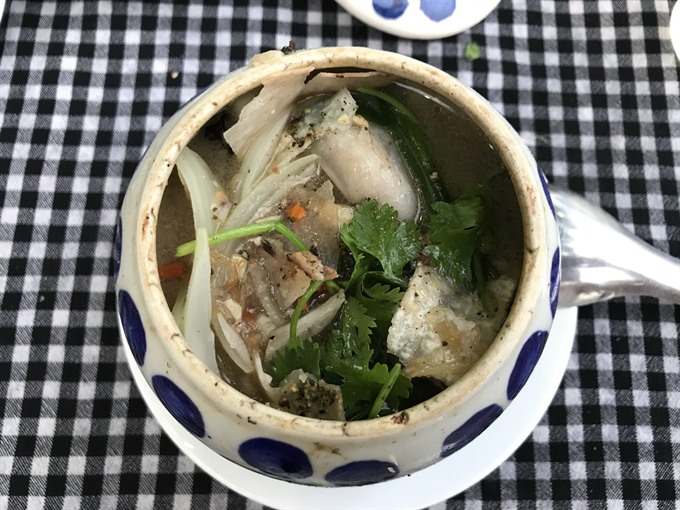
See and smell: When the hot bowl is put on the table and the lid is opened, one may be lured by the scent of well-cooked fish eye. VNS Photo Lê Hương
After being washed carefully, the fish eyes are scalded by boiling water and then covered with tapioca starch. The eyes are then deep fried for some minutes, according to Nguyễn Tấn Tài, a cook from Hùng Vương Hotel, Tuy Hòa City.
Mai Quang Khánh, another local cook, told Việt Nam News that he always put the fish eyes inside pumpkins after he removes the seeds. He also puts inside chopped turnip, carrot and pepper and then bakes the whole pumpkin. Eaters can eat the whole dish, including the pumpkin exterior.
Tài said tuna fish eyes have also been used for various dishes in Japan and South Korea due to their delicious taste and the amount of DHA and Omega 3, which are good for the brain.
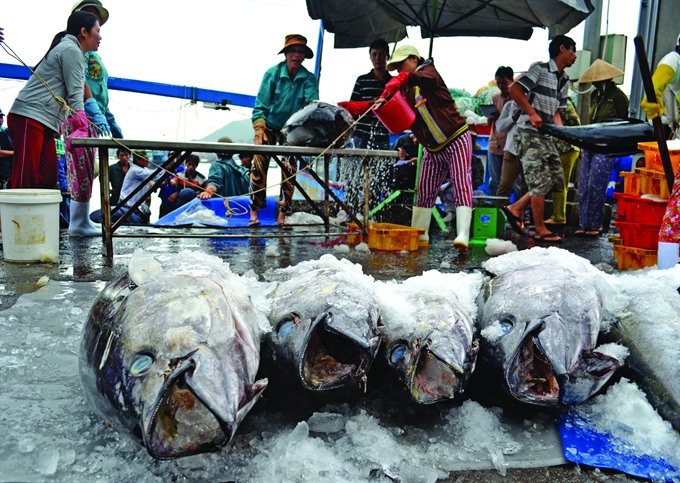
Sea cow: Phúc Yên has been considered the capital of tuna. Photo chiecthiavang.com
“Before 1990, Japanese people even did not eat tuna eyes. They threw them away,” Tài sad. “But since they discovered that tuna eyes are good for the brain, they have been interested in processing various dishes from the eyes.”
Tài said that in Japan, a popular dish from tuna eyes is the eyes boiled in water with sugar, soya sauce and some sake wine. They sometimes fry and stew the eyes as well.
“South Koreans do not cook tuna eyes,” he said. “They don’t eat the whole eye but only the cartilage inside. They mince the cartilage inside the eye and put it into a glass of soju wine and eat the mixture.”
Other restaurants may stew the fish eyes with lotus seeds or eggs.
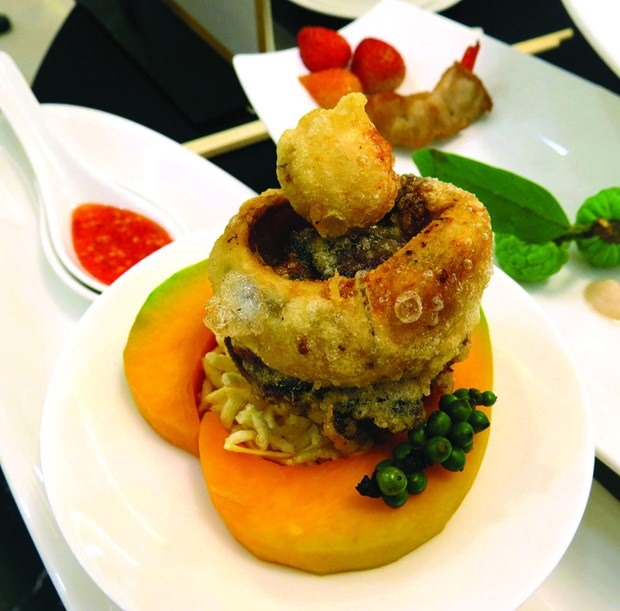
Take a look: Deep fried tuna eyes. Photo chiecthiavang.com
In 2014, the Việt Nam Record Organisation named two delicacies of Phú Yên — ocean tuna and Ô Loan Lagoon blood cockle— among the top 10 delicacies in Việt Nam.
My advice for you when trying the eye for the first time: order one eye for the group to share first. Then, if you find the taste ok, call for more! Not everyone likes the fatty and fishy taste of the dish. Bà Tám Cá Ngừ in Lê Duẩn Street in Tuy Hòa City is among the most famous places to try the dish.
“Phú Yên is beautiful, with energetic people and special dishes at very cheap price,” said tourist Vương Ngọc Hải of Hà Nội, “I want to return here every year.” — VNS